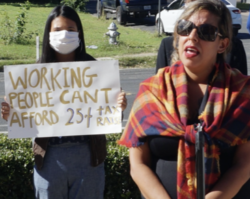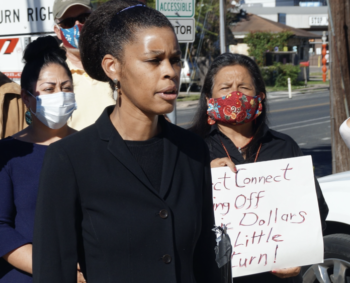Progressives Against Project Connect and others opposed to hefty permanent property tax increase
It’s a well-worn cliché in American politics that Progressives want to raise your taxes whereas Conservatives want to cut them. But the reality is more nuanced. At least in Austin this fall, where some Progressives are taking a stand against a tax increase known as Proposition A.
A self-described group of “Progressives Against Project Connect” held a press conference September 30 to air their grievances about the proposition, which asks voters to approve a property tax rate of $0.5535 per $100 of property valuation before exemptions. That rate is $0.0875 higher per $100 valuation than the voter-approval tax rate, a 20.4 percent increase over the current level.
The new tax would fund an expansion of Austin’s public transit system through a proposal called Project Connect. The project’s “initial investment” of $7.1 billion, as approved by the Austin City Council and the board of the local transit authority, Capital Metro (CapMetro), calls for three new passenger rail lines, an underground tunnel downtown, and a variety of new bus routes.
Austin presently has just one commuter rail running from Downtown, looping through East Austin and then north to Leander.
At the press conference held in front of Capital Metro’s East 5th Street headquarters, speakers said the new rail lines would disproportionately serve commuters from outlying suburbs, without adequately improving bus service for taxpayers within the city.
“Project Connect will expand services for white commuters coming from the suburbs,” said Zenobia Joseph, a Northeast Austin resident. “The people who need the service the most will not benefit.”
As evidence for that claim, she cited a 2015 Origin and Destination Survey that found that 70 percent of rail riders were white compared to only 36 percent of bus riders. Blacks accounted for only 6 percent of rail riders in that survey compared to 20 percent of bus riders.
In the meantime, the tax increase, coupled with rising property values, would accelerate the displacement of low-income and middle-income Black and Hispanic families—a process widely referred to as gentrification.

“We have been facing gentrification for the last nine years. We are barely holding on to our homes, we’re barely holding on to our schools, we’re barely holding on to the culture that was once here,” said Bertha Delgado, president of East Town Lake Citizens Neighborhood Association. “Our city deserves better than this.”
“We have lived here all of our lives. And most of us can’t (afford to) live here any more. We are compacted in homes to where we’re living on the floor and couches. Some people are living in their cars.”
The dozen or so people at the event wore face masks, carried hand-made signs, and chanted “Project Connect, Disconnect!”

Susana Almanza, a former city council candidate and director of PODER [People Organized in Defense of Earth and her Resources] carried a sign saying the transit plan would “siphon off public dollars with little public return.”
“Project Connect is a modern day iron horse, yes, the iron horse that first removed indigenous people from this land,” she said. “Project Connect will be removing people of color and low-income people from their communities.”
She argued that the tax impact of Project Connect “will make it impossible for low-income (people) and people of color to hold onto their property and also will make it very expensive for renters.”
“We ask Austin Progressives to really consider what the long-term impacts will be in how our communities look,” said Anaka Rivera, a homeowner. “The diversity of people and ideas that makes the city great is at risk and it is our responsibility to challenge policies that ignore that.”
Inadequate bus service
Several speakers at the event called into question Project Connect’s emphasis on rail rather than bus service, complaining that current bus routes are inadequate and too infrequent.

Joseph said, “Oh, they get on the Black radio station (KAZI FM 88.7) and they tell us, ‘more frequency,’ we should get excited about 15 new circulator buses. Well, let me tell you about those circulators: they only have $1.5 million out of $7.1 billion for neighborhood circulators. And where do they take you? A half a mile to maybe two or three (miles) down the road, for you to wait a second time.”
Joseph was referring to the investment plan approved at a July 27 CapMetro meeting, which includes just $1.5 million for circulators, or 0.02 percent of Project Connect’s “initial investment” phase.
“Black people today in Craigwood and Colony Park wait 60 minutes for the bus,” she added, referring to two East Austin neighborhoods.
Under Proposition A, that area would be serviced by a new Green Line commuter rail station connecting to downtown, according to Project Connect’s system map.

Another concern is that any cost overruns on the rail project could end up affecting other city services, like public health, public safety, and homeless services, according to Fred Lewis, an attorney and self-described Progressive activist who helped organize the September 30 event.
He said that transit projects nationally tend to run over-budget, adding, “it’s going to end up squeezing the budget for social services.”
“Austin has a very bad habit—and I say this as a big-spending New Liberal Democrat—they have a bad problem of flying an airplane without any fuel on it and then when they’re in flight trying to figure out where they’re going to get the fuel, i.e. the funds.”
That concern is echoed by Voices of Austin, a 501(c)4 political organization, which stated in a recent press release, “Capital Metro’s last major rail project, the Red Line, wound up 233 percent over budget.”
Skepticism of ‘anti-displacement’ funds
City leaders backing Project Connect have acknowledged that development along transit corridors could displace existing residents. The council adopted a resolution July 27 directing the city manager to include $300 million in the Project Connect dedicated fund for “transit-supportive anti-displacement strategies.”
Similarly, in an August 24 resolution, the Capital Metro board adopted anti-displacement as a “guiding principle,” citing the importance of “equitable growth” and “prevention of displacement of lower income residents from areas served by Project Connect’s transportation projects.”
The text of Proposition A itself refers to funding for “transit-supportive anti-displacement strategies related to Project Connect.”
But critics believe these promises are mere lip service, and they question how the $300 million for anti-displacement will be used, and whether it could really offset the impacts of a 20.4 percent tax increase and a construction boom that is expected to take place along transit corridors.
David King, who spoke at Wednesday’s press conference, said, “The proposed $300 million for displacement will facilitate market-rate redevelopment like the AMLI luxury apartments and the Domain on Riverside Drive that primarily serve high-income families and high-income businesses and displace low-income families, families of color, and small community based businesses against their will.”
“What they’re going to do with those $300 million is they’re going to gin up the high-density luxury development along these corridors and then sprinkle in a couple of ‘affordable’ units at 80 percent MFI (median family income), which will not serve the low-income families that are being displaced.”
Susana Almanza said, “We saw it in 2010 when they first started the first light rail. We saw the Riverside master plan come to fruition, and we’ve now seen over 2,000 people have been displaced from the Riverside corridor. And all the affordable apartments are gone and now we only have high-rent apartments in the Riverside Corridor. And that is the first experience that we had with the modern day iron horse, the rail, coming into East Austin.”
Outdated technology?
Some opponents of Proposition A believe that commuter rail is an outdated technology and the $7.1 billion for Proposition Connect could end up being wasted if new mobility technologies develop within the next decade or so while the rail lines are still being constructed.
Our Mobility Our Future, a political action committee opposing Proposition A, calls Project Connect a “massive, obsolete, ineffective transit system.”
In a position paper, they cite the growth of ride-hailing services Uber and Lyft, and micro-mobility services offering scooter and bike rentals, as well as self-driving systems in new automobiles that could reduce accidents and help maximize traffic flow.
“Fixed-route/fixed-schedule rail systems like Project Connect are ineffective and obsolete,” says Our Mobility Our Future in the position paper. The PAC raised $98,620 during the first six months of the year, according to a July 15 campaign finance report.

Big backers of the Our Mobility Our Future political action committee include Precinct 3 Travis County Commissioner Gerald Daugherty, a Republican and longtime opponent of rail projects, including defeat of the November 2000 rail referendum by fewer than 2,000 votes. Daugherty made three donations to the Our Mobility PAC totaling $14,000. Jim Skaggs, a retired high-tech executive who teamed with Daugherty to defeat the 2000 rail initiative, matched Daugherty’s $14,000 in contributions. Continental Automotive Group founder Bryan Hardeman kicked in $20,000 and real estate investor John Lewis gave $24,000 ($5,000 of which was refunded). In addition, the PAC netted a total of $75,000 in pledges from Vicki Roberts ($50,000), the owner of a Lexis dealership, John McCall ($24,000) and Roger Roberts ($1,000) that will come in handy as the campaign moves toward election day.

The PAC spent $5,000 of that war chest with Voices of Austin, another group opposed to the rail proposition. The group is chaired by retired State Senator Gonzalo Barrientos and its executive director is longtime political consultant Peck Young.
Voices of Austin is attacking the City of Austin over how it structured Project Connect—as a permanent tax hike for maintenance and operations, rather than a one-time project bond. “Austinites need to know that this isn’t a bond election. You can pay off a bond,” said Young. “This election is about a permanent tax hike. Once this proposition passes, Austin renters and homeowners will continue to pay the higher amounts.”
Pandemic effect
Skeptics also believe that the coronavirus pandemic could usher in a permanent shift toward more teleworking, which would reduce the strain on Austin’s road network. In a campaign ad, Our Mobility Our Future said, “An increasing number of people will be working remotely, and this kind of transport just won’t be necessary. Downtown offices will no longer be a destination for as many workers as CapMetro is putting into its ridership estimates.”
Similarly, Voices of Austin asked in a September 4 press release, “With telecommuting on the rise, is Project Connect ‘critical’?” As evidence for the trend toward teleworking, the group pointed to news that a developer recently canceled a 31-story downtown high-rise project.

But CapMetro CEO Randy Clarke has pushed back at this line of argument, saying in a recent virtual roundtable hosted by the Austin Business Journal, “A majority of the economy will never be remote. Your dentist is never going to work remote, the person who cuts your hair is never going to work remote. You love going to Torchy’s or Tacodeli to get a taco? Not remote. You want to go to a UT football game? Not remote.”
Clarke also rejects the characterization of railways as outdated, saying, “We want to use tech very heavily. We will build probably the most advanced rail system in North America.”
The CEO also noted that he could see neighborhood circulator buses “eventually becoming automated to some extent.”

Not all critics of Project Connect oppose the idea of rail in principle—it’s the timing of it and the way of financing it that they object to. “We’re not against public transportation. We are against egregious spending and higher property taxes for unnecessary and poorly thought-out transportation projects,” said Peck Young, executive director of Voices of Austin.
David King, a citizen who spoke at the September 30 press conference, lamented that “Proposition A is an all-or-nothing proposal that prevents voters from voting for transit options that work best for them, their families and businesses.”
He suggested, “The proposal should be scaled back and implemented in smaller less expensive phases that produce equitable public benefits and improve the efficacy and equity of the transit investments.” King noted that he supports the other mobility bond, Proposition B—which will fund new sidewalks, bikeways, and trails—but not Prop A.
Fred Lewis, the lawyer, said he did have some concerns about rail’s potential obsolescence, but also noted, “I have supported every transit program that has ever been on the ballot in Austin. I’m not supporting this.”
Positions of council candidates
Proposition A, or Project Connect, is supported by every member of the City Council, including the four running for reelection this year.
Proponents argue that Austin’s nasty traffic jams are bad for the environment and will only get worse as the city grows. Moreover, maintaining a car is expensive, so enabling people to get around without one would make the city more affordable.

District 4 Council Member Greg Casar, an ardent supporter of the transit plan, refers to Proposition A on his website as part of “Austin’s Own Green New Deal.” Together with Proposition B, he said, the plan “will not only save us time stuck in traffic, but gives our community the option to walk, bike, or take rapid transit, greatly reducing our city’s contribution to climate change.”
Challengers in several council districts oppose the plan. In a race for an open seat in District 2, two candidates support Prop A—David Chincanchan and Vanessa Fuentes—and two candidates oppose it, Casey Ramos and Alexander Strenger.

Ramos, a former professional boxer, told The Austin Bulldog in an interview, “We can’t even get our grass cut. Every part of our infrastructure is overgrown… We’re talking about all these grand schemes of building tunnels under the highway and building a $7 billion rail that’s probably going to keep increasing in cost as it goes—and we don’t even have basic infrastructure needs met.”
Ramos has argued that for a fraction of the price of Project Connect the city could increase the number and frequency of bus routes. But Ramos faces an uphill battle in his race for D2. Before he had even declared his candidacy, his two principal opponents, Vanessa Fuentes and David Chincanchan, together had raised $80,667 through the first six months of the year. Ramos and Strenger jumped in late and had raised nothing.
Widespread support among elected Democrats
Most elected Democrats in the city also support Proposition A. When the Travis County Commissioners Court scheduled a vote September 29 to express concern about the tax hike, numerous elected Democrats signed up to speak against the resolution.

Registered speakers on behalf of Prop A included State Senator Sarah Eckhardt, State Representative Gina Hinojosa, Mayor Steve Adler, and three council members, according to a press release written by Caleb Pritchard, an aide to Council Member Natasha Harper-Madison.
Leaders of the Austin Justice Coalition, Housing Works Austin, Austin Area Urban League, and Laborers International Union of North America also were planning to speak on behalf of the proposition, before the County Commissioners pulled the agenda item over a legal concern.
Through a press release, Commissioner Gerald Daugherty said he had put the item on the agenda because he was “concerned the passage of Proposition A would have a detrimental impact on local businesses and on Travis County’s ability to collect future tax revenue.”

Daugherty is the only Republican on the Commissioners Court, but at least one other commissioner, Democrat Margaret Gómez, has a record of voting against a rail-related measure in 2018, a study for the prospective Green Line between Austin and Manor.
This wouldn’t be the first time the county commissioners court disagreed with the city council over a policy issue. In August 2019, they parted ways over an increase of the hotel occupancy tax, a tax paid by hotel guests. The Austin Monitor reported the city raised the tax to the maximum level, despite a request from then-County Judge Sarah Eckhardt not to do so.
In that vote, the city’s political establishment aligned with the Chamber of Commerce and developer interests, who favored the tax increase as a way of funding an expansion of the downtown Convention Center.
A similar coalition of business and political interests is backing Proposition A. “The development community loves fixed guideways,” said Jeff Jack, an architect who opposes the new transit tax. “It captures a market share for them, it guarantees their finance.”
“Looking at the long-term prognosis of transit, we have to think about flexibility, and a fixed guideway doesn’t give that—but it does give developers certainty about future market share,” Jack said.
Fred Lewis recognizes that the opposition faces an uphill battle over Proposition A. If Austin’s majority Democratic voters end up listening principally to Democratic leaders and political operatives, he said, rather than doing their own research on the rail plan, the ballot measure could succeed: “People need to study this as best they can.”
“Evaluate it based on the evidence and their values. What they shouldn’t do is vote for it because some paid Democratic consultant tells them to do it,” Lewis said.
 Trust indicators: Bulldog reporter Daniel Van Oudenaren is a journalist with more than a decade of experience in local, state, and international reporting.
Trust indicators: Bulldog reporter Daniel Van Oudenaren is a journalist with more than a decade of experience in local, state, and international reporting.
Links to related documents:
Austin City Council Resolution directing the city manager to invest in the Project Connect System Plan, July 27, 2020 (4 pages)
Capital Metro Resolution for funding and commitment for Project Connect, August 24, 2020 (7 pages)
Our Mobility Our Future campaign finance report, July 25, 2020 (14 pages) 20200715 OMOF CFR
Notice of Public Hearing on Tax Increase for August 12, 2020, which shows unanimous City Council support for a tax rate of $0.5335 per $100 valuation (1 page)
Project Connect System Plan, Initial Investment, adopted June 10, 2020 (graphic)







